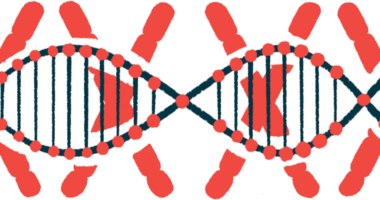Allopregnanolone May Help Improve Cognitive Function in Fragile X-Associated Tremor/Ataxia Syndrome, Study Suggests

Weekly infusions with allopregnanolone, a natural brain steroid, for up to 12 weeks may help enhance levels of the GABA neurotransmitter and improve cognitive outcomes in patients with fragile X-associated tremor/ataxia syndrome, a small study suggests.
The study, “Allopregnanolone Treatment Improves Plasma Metabolomic Profile Associated with GABA Metabolism in Fragile X-Associated Tremor/Ataxia Syndrome: a Pilot Study” was published in the journal Molecular Neurobiology.
Currently, only palliative therapies are available for patients diagnosed with fragile X-associated tremor/ataxia syndrome (FXTAS), characterized by progressive tremor and ataxia (clumsy and uncoordinated movements), executive function and memory deficits, among other symptoms.
Allopregnanolone is a natural neurosteroid, i.e., a steroid molecule produced in the brain and structurally similar to the hormone of progesterone or testosterone.
Studies have shown that allopregnanolone has beneficial effects in mouse models of Alzheimer’s disease, reversing learning and memory deficits and preventing nerve cells’ death.
Allopregnanolone works by binding to GABAA receptors, enhancing release of the GABA neurotransmitter by nerve cells. Fragile X patients have low levels of GABA and deregulated GABA receptors. Neurotransmitters are chemical messengers that communicate among neighboring brain cells.
A team of researchers at the University of California, Davis evaluated the therapeutic effects of allopregnanolone.
They studied six male FXTAS patients, all carriers of a FMR1 premutation, enrolled in a 12-week open-label Phase 2 trial (NCT02603926). A premutation carrier is a subject, male or female, who has between 55 and 200 repeats of three nucleotides — CGG — in the FMR1 gene (nucleotides are the building blocks of DNA). While a healthy person has about 30 CGG repeats in the FMR1 gene, in fragile X patients, there can be more than 200.
Patients received weekly infusions of allopregnanolone at escalating doses — 2mg, followed by 4mg and 6mg — over a period of three weeks. The 6mg dose was well-tolerated and was selected to continue the treatment up until week 12.
Researchers evaluated patients’ clinical and neuropsychological parameters two days before the first infusion and two days after the last infusion.
They looked at how the treatment influenced GABA metabolism and the expression of markers of inflammation and oxidative stress. Additionally, the team quantified tremor and ataxia, as well as patients’ mental state, motor and cognitive functions before and after treatment.
The results showed that allopregnanolone improved GABA metabolism, which was accompanied by improvements in patients’ mental state, cognition and executive function, working and episodic memory, and anxiety. Episodic memory is the collection of past personal experiences that occurred at a particular time and place; working memory is responsible for temporarily holding information available for processing.
Learning and memory were evaluated using the California Verbal Learning Test 2, while tremors were assessed with the Cambridge Neuropsychological Test Automated Battery (CANTAB), where participants hold a tremor pen that is connected to a computer.
They used blood samples from the six patients to look at their metabolism, using a technique called metabolomics. The values of the patients were compared to those obtained with blood samples from non-carrier subjects. Allopregnanolone was seen to reduce all three markers used as a readout of oxidative stress — indolacetic acid, methionine sulfoxide, and 2-hydroxybutyric acid.
Oxidative stress is an imbalance between the production of free radicals and the ability of cells to detoxify them. These free radicals, or reactive oxygen species, are harmful to the cells and are associated with a number of diseases.
The levels of indolacetic acid, for example, have been correlated with symptoms of anxiety and depression, suggesting that a decrease in oxidative stress may help reduce the risk of psychiatric problems, according to researchers.
The team observed that the magnitude of improvements in GABA metabolism, as well as the improved performance in several behavioral tests, was carrier-specific, “aligned with the concept of precision medicine,” researchers stated.
Precision medicine is an emerging approach for disease treatment that takes into account an individual’s variability in genes, environment, and lifestyle. This enables doctors to predict more accurately which treatment for a specific disease will work in which patient.
“Based on this pilot study, allopregnanolone treatment has the potential for improving cognitive and GABA metabolism in FXTAS,” the authors concluded.






